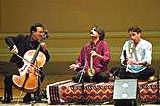Yo-Yo Ma Ends His Silk Road Caravan Tour Into Carnegie
Hall
 |
| Yo-Yo
Ma, left, performs with two members of the Silk Road
Ensemble at Carnegie Hall in New York, Saturday, May
4, 2002. |
Cellist and eternal optimist Yo-Yo
Ma swallowed some water and paused for a long moment before
recalling the time his long-planned Silk Road Project nearly
got swept away by the tide of history.
On Sept. 11, he was in Denver to give a concert,
Ma told an audience at Carnegie Hall last weekend.
"My wife called up and we talked on the
phone for an hour," he said. "I couldn't turn
on the television."
In subsequent days, he and planners of the
project a celebration of music and culture from the ancient
route that linked Europe and Asia held discussions.
"We constantly questioned, 'Should we
do it?'" Ma recalled.
They canceled trips to the Central Asian countries
of Tajikistan and Kazakstan, but instead of dropping the
project that was hatched three years earlier, they added
performances in Dallas and Atlanta.
"There was a need for people to be together.
There was a need to continue," Ma said. "I think
we'll do it with even more devotion, more passion."
Those cities were selected because of their
Muslim populations, he said.
During the first millennium B.C. through the
middle of the second millennium A.D., civilizations traded
everything along the Silk Road from noodles to knowledge,
rice to religion, silk to spices. Ma calls it "the
Internet of antiquity."
This week, Carnegie Hall became the latest
caravansary for the tour, which began last August
in Europe and has played in Japan, Chicago, California and
Washington, D.C. This summer, the Smithsonian Institution
will devote its 36th annual folklife festival to the project.
And more concerts are scheduled for Seattle, Chicago, California
and Vancouver through fall 2003, when the musicians finally
go to Central Asia.
With funding from the Aga Khan Trust for Culture,
the Ford Foundation, Siemens and others, the Silk Road Project
has brought together hundreds of folk musicians and spawned
compositions for Eastern and Western instruments. A
study guide has been developed for teachers and students.
A CD, "Silk Road Journeys: When Strangers Meet,"
was released in April by Sony.
Ma, born in Paris to Chinese parents and raised
in America, is the thread that stitches the project
together. On Saturday night, the first of three concerts
at Carnegie Hall, he played in seven of the nine pieces.
Throughout the itinerary, which included
pieces from China, Uzbekistan and France, Ma's charismatic
personality and entrancing playing broke through any language
or cultural barrier.
The program began with Khongorzul Ganbaatar
singing a Mongolian long song. Dressed in silken robes of
turquoise, purple, red and gold, white boots and a black
hat that looked like a tower, she offered an example of
traditional desert communication. Singing without accompaniment,
her voice echoed through Carnegie's Isaac Stern Hall.
